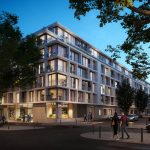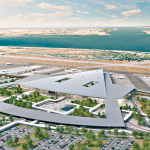Lisbon Mayor candidate will shake up planning permission processes
The front-running candidate who will face Lisbon Mayor Fernando Medina at the municipal council elections on 26 September, Carlos Moedas, has promised to shake up the notoriously slow and bureaucratic planning permission processes at city hall.
Addressing a select number of business leaders at the International Club of Portugal (ICPT) on Wednesday this week, Moedas, who until recently completed a term as European Commissioner for Science Research and Innovation, a post he had held from September 2014, also said he would get young professional people and families back into the centre of Lisbon by providing affordable housing for rent whereby the rents would be subsidised so as not to exceed more than 30% of take-home salaries.
Carlos Moedas, who studied engineering and business management, but moved into property consultancy where he was well known in Lisbon heading the consultancy Aguirre Newman (2004-2008), also denied he was just standing for the post of mayor because he wanted to use the position as a stepping stone to a political career as some former Lisbon mayors had done before him.
“Why have I left a comfortable position to take up this challenge? Because, I felt that after working at the EU for five years, I needed to return and do something for the city. I looked at my kids and thought I needed to do something for them; for the future of our society – a society which is actually stagnating and where people get up in the morning and don’t believe that anything can really change.”
Moedas points out that cities represent just 2% of the surface area of our planet, yet 50% of the population of the world live in cities. Also, 75% of all energy consumption in the world derives from cities as does 80% of CO2 emissions.
These numbers, he said, convey a very important message about today’s world — the future will not be constructed not so much by countries, but rather in their cities, with competition between them. “A mayor has to be someone who understands this, and has a vision for this competition between cities worldwide and not just the cities in his or her own country.”
Moedas says that the world’s environmental problems have to be tackled at a city level too, but with a global approach. “When Donald Trump took the US out of the Paris Accord he didn’t succeed with the US’s cities, because they didn’t want to”. Digitalisation too would be achieved not by countries but by cities, while a staggering 3 million people moved into cities each week.
“Lisbon is not in the champion league when it comes to cities. We have Web Summit, but that is a fair not companies setting up in Lisbon. Over the past three years Lisbon fell 35 places in the most important league tables for entrepreneurship,” he said.
Improving cultural offer
Moedas explained that in terms of cultural offer Lisbon was not in the European top league tables and gave the city’s Museum of Old Art (MNAA), perhaps grossly unfairly, as an example of a capital city museum that falls short and could be so much better.
He said parts of Lisbon were “forgotten” with 1 in ever 5 living in poverty or isolation. “We need to think about how Lisbon can be in the champions league,” he said.
“Cities which invest more in innovation and culture and invest in people and listen to people are better at attracting and developing innovative companies. If we don’t listen to people today, then we’re not a great city.”
The mayoral candidate criticised the council’s cycle paths policy which were “badly thought out” and represented an example of the council not listening to its residents. “What use are they if they are being used by fire engines, ambulances and priority vehicles?”
In his first 100 days as mayor, Carlos Moedas said he would start “transforming (Lisbon) into a factory of companies” because attracting fairs and talent was not enough.
“We need company discipline, development and production processes that work and not just talk of innovation and technology summits. We need the Beato Hub (a startup incubator in East Lisbon) to not just be a startup and property project, but start becoming a real factory of companies, like Station F in Paris or Rocket Internet in Berlin, where ideas are turned into products through processes with mentors and investors capable of turning a idea into a large company, not just micro-companies that employ five or 10 people and never develop,” said Moedas. Building this discipline and these processes will be a top priority if he is elected mayor.
Moedas points out that the best cities in terms of technology and innovation also have the best and widest range of cultural offer.
“We have to change the way we look at culture and finance it. “I will bring my experience at the EU to see how we can better finance culture with a team of experts who will take these decisions, taking out the political component of the policy making aspect of culture, so it will be based on merit instead.”
The question of giving importance to culture had to start early with education, as is the case in countries like Norway which has one of the largest projects in the world to integrate music, dance and theatre in society through education, from primary school onwards. Moedas pledges to create spaces in every neighbourhood for cultural activities: ‘A Theatre in Every Parish’.
Cities for the People
The third commitment to Lisbon would be putting the people front and centre of municipal policy. Here Moedas is very much influenced by the great urban planner and philosopher Jan Gehl who expounds his ideas in the groundbreaking and best-selling book ‘Cities for the People’.
For more than forty years Jan Gehl has helped to transform urban environments around the world based on his research into the ways people actually use — or could use — the spaces where they live and work. In this revolutionary book, Gehl presents his latest work creating (or recreating) cityscapes on a human scale. Gehl emphasises four human issues that he sees as essential to successful city planning. He explains how to develop cities that are lively, safe, sustainable, and healthy. Focusing on these issues leads Gehl to think of even the largest city on a very small scale.
For Gehl, the urban landscape must be considered through the five human senses and experienced at the speed of walking rather than at the speed of riding in a car or bus or train. This small-scale view, he argues, is too frequently neglected in contemporary projects. Gehl also makes a plea for city planning on a human scale in the fast-growing cities of developing countries.
Explaining his vision for cities on the whole, he said that Lisbon City Council should act as a developer in partnership with private entities to provide housing for affordable rent too, pointing to Vienna in Austria as a case study.
With its affordable and attractive places to live, the Austrian capital is fast becoming the international gold standard when it comes to public housing, or what Europeans call “social housing” ― in Vienna’s case, government-subsidised housing rented out by the municipality or nonprofit housing associations. Unlike public housing projects, in the US, for example, which remain unloved and underfunded, the city’s schemes are generally held to be at the forefront not only of progressive planning policy but also of sustainable design.
“Lisbon’s record in terms of affordable housing is awful. We have a housing programme that doesn’t work and only 300 affordable homes have actually been built out of the 6,000 initially promised,” he said.
“It’s like a lottery, whereby 10-20,000 people are competing for anywhere between 10 and 40 homes. People feel cheated. The model isn’t working and we need to think about various models,” he added, pointing out that Lisbon City Council had many tracts of land and property in the city which could be made available for housing to rent.
One such model – and again used in Austria where the city council also acts as a partner developer with private companies and where the model works very well – is the cooperative model in which communities join together to build their own apartment buildings.
“The Council has lots of land and empty buildings, and I have asked several times for the council to give me the list and they haven’t done so. When it comes to affordable housing built on land purchased by private developers the prices are always high.”
Carlos Moedas is also known to be an admirer of the style of leadership shown by the Mayor of London, Sadiq Khan who he calls “an inspiration”.
Planning permission permits
On the issue of corruption, both at city hall and parish council levels, Carlos Moedas said it was a question of rules and transparency. You could not change the world in two days, or even in one term of office, you need two.
Carlos Moedas also opined that the entire planning permission process for development projects needed to be sped up made more efficient and modernised, which he will also do if he becomes elected as mayor.
“We have to change, and as quickly as possible, what is now one of the worst scourges of Lisbon – the problem of planning permission permits.”
“I don’t understand, being an engineer, how a project filed with the city council, even simple projects that don’t even need outside consultancy, can fester for years there. I will present very specific licensing measures and procedures both for simple projects, and complicated ones that do need consultants,” said the mayoral candidate. “These delays are having a dreadful and damaging effect on property prices”.
Improving the metro system
Moedas said that Lisbon’s mobility policies placed the city as one of the worst in Europe. There are few cities in the world where residents don’t have a metro station near their homes and Lisbon, in may areas, is one of them.
The solution is to extend the metro system (because 50,000 people do not have a metro nearby their homes) to the riverside zone of Alcântara which is currently only served by buses, trams and the Lisbon to Cascais rail line. His leadership would also create a ‘loop line’ within the existing metro scheme to improve mobility and inter-modal transport systems.
Last and not least, Moedas’ programme will tackle festering problems concerning the social state, which in Portugal, he says, is failing its citizens.
“Lisbon has to create its own social state within the State. One which is local and which can deal with many of the problems which central government currently does not adequately cater for”.
“When we have an additional 140,000 over 65s in Lisbon today, then we must take very concrete measures for these people. They cannot be waiting forever for a doctor’s or hospital appointment. We will also begin a pilot a social carers project and create a dedicated and formal network of social carers in Lisbon”.
Carlos Moedas also praised the International Club of Portugal and its President Manuel Ramalho as “extremely important for promoting diversity and inclusion; a club that had been created in Portugal but was outward looking to and for the world.
The candidate for city hall also welcomed Isabel Galriça Neto who would be the future president of the Lisbon Municipal Assembly if he wins the elections in September.










